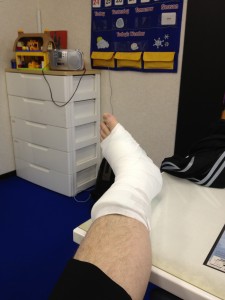curriculum ES expectations language courses public policy teaching
by sendaiben
14 comments
If I ruled the world… elementary school English in Japan
This is the first instalment of my master plan to improve English education in Japan. I’m going to start with elementary school (I don’t have anything concrete to say about pre-elementary school education, especially given how fragmented and individualised it is) today, with junior high school, senior high school, and university following later in the week.
The Current Situation
My impression of what is going on in elementary school at the moment: English is taught in elementary schools for 30 hours each in the 5th and 6th grades. It is not a subject, but rather part of general studies. The purpose of the classes is not to acquire English per se, but rather to get exposure to language learning and international issues in a light-hearted and fun way. Classes are taught by homeroom teachers and visiting assistant language teachers (both native and non-native speakers of English). The current guidelines state that reading and writing should not be introduced. There is little training for elementary school teachers, and the curriculum is limited to the official textbook series Hi Friends.
My Thoughts on the Current System
I was cautiously optimistic about English classes being rolled out across all elementary schools. I used to work in an elementary school that was a test case for the city -all students had English once a week and the school had a specialist teacher who only taught English as well as a full-time ALT (me)- and I thought maybe the government would implement something like that.
Instead it has been a bit of a waste. The goals are unclear and vague, there has not been anywhere near enough training (I have done training for elementary school teachers, and it was discouraging to see how stressed and scared they were about conducting English classes), the content of the classes doesn’t match the students’ developmental levels, and there is little to link the elementary school and junior high school curriculums.
I still believe it could be very beneficial for students to start English earlier than junior high school, but it has to be done properly. If not, it might not be worth doing at all.
My Recommendations
I would like to make several suggestions as to what the government could do to improve English education in elementary schools. I have tried to make them as specific and concrete as possible.
- Assign an English specialist teacher to each school
This teacher would be responsible for leading English classes alongside the homeroom teacher. The teacher could be an elementary school teacher or an ALT. This would take a lot of pressure off regular homeroom teachers, as well as allowing English specialists to develop their expertise. - Implement English throughout elementary school
I would recommend five minutes per day for first and second graders, based around songs and short chants. Third and fourth graders could learn vocabulary thematically and practice simple phrases, again in daily short sessions. Fifth and sixth graders would learn basic phonics. - Link the elementary and junior high school curricula
Students can do a quick review in the first weeks of junior high school before continuing to build upon what they have already done. By covering basic phonics as well as learning vocabulary in elementary school, students could concentrate on learning how to use the language in junior high school.
I think the three proposals above would be a good beginning for making English instruction in elementary schools more effective. Any thoughts? What would you add or take away from that list?
blogging curriculum EFL ES expectations high school junior high school public policy teaching university
by sendaiben
leave a comment
I have a dream… for Japan’s English education
I was very negative about the Japanese government’s proposal to use TOEFL to screen university applicants. It’s easy to criticize, to offer up reasons why things won’t work. It makes you feel important, contributing to the conversation in that way. It even feels productive sometimes, like you are saving people from making mistakes.
I still think indiscriminately imposing the TOEFL test on students in Japan is a flawed idea, and next week on this blog I am going to offer up some alternatives.
I will post my suggestions on how I think English education in Japan can be improved at the primary (elementary school), secondary (junior and senior high school), and tertiary (university) levels.
And then you can all have a go at criticizing me 🙂
* give yourself a pat on the back if you know who the guy in the picture is
curriculum evaluation expectations high school public policy teaching testing university
by sendaiben
17 comments
Japan to use TOEFL as university entrance hurdle?
You may have read about the Japanese government’s suggested plan to use TOEFL as a screening test for university entrance. If not, here are some online articles:
Japan Times (March 25) “Abe Wants TOEFL to be Key Exam”
Japan Times (March 25) “LDP urges TOEFL scores as college entrance, graduation requirement”
I am not an expert on the TOEFL test, and I am not privy to the details of this plan, such as what kind of scores they are planning to require, or how they expect high schools to prepare students for the TOEFL. However, I think this is a horrible idea.
I am really opposed to using tests out of context, for purposes other than the ones they were designed for. This applies especially to the TOEIC and TOEFL tests. As far as I am aware, TOEIC is a test designed to measure English proficiency within a working environment. Apart from the language, it also requires test-takers to have some idea of working environments and tasks. I find that young people with no experience of working in office or professional environments are at a real disadvantage taking the test -basically it is not designed for them.
I believe TOEFL is designed to measure how well candidates will deal with studying in an English-language institution. It is looking at whether they will be able to understand lectures, write papers, take notes, participate in discussions, etc.
Using these tests indiscriminately to measure general language proficiency or achievement is surely less than ideal.
I am opposed to using the TOEFL test to pre-screen candidates for university entrance, as suggested in the articles above, for the following reasons:
- The test is inappropriate to measure English achievement over the entire student population, as opposed to a select few who intend to study abroad
- Regular high schools are not in a position to prepare students for these tests, which means that students will have to go to the private sector if they want to go to university, which means that only relatively affluent students will be able to go to university
- The bar will have to be set so low on the TOEFL iBT in order for normal students to pass it as to render the whole thing meaningless
- A foreign company like ETS should not have this much influence on Japan’s national curriculum: giving it to them is an abdication of responsibility on the part of the Ministry of Education
- The test is expensive, and presumably most students will take it several times to try to maximize their score, adding 30-50,000 yen to the cost of applying to university
Basically this is the latest in a series of ‘reforms’ that start from a positive goal (improve students’ practical English abilities), then completely fail to implement steps to achieve that goal, due to lack of knowledge, political will, or sheer incompetence.
What do you think about this idea? Is it going to help Japanese students?
curriculum Dolphin Readers EFL eikaiwa ES expectations extensive reading graded readers kids language courses materials oxford owl oxford phonics world Oxford Reading Tree phonics presentations school management video
by sendaiben
leave a comment
VIDEO Oxford Teaching Workshop Series 2013: Creating a Reading Program for Young Learners
This year I was very fortunate to be invited to be part of the Oxford Teaching Workshop Series, presenting in four cities in Japan this spring. This video is from the Okayama session:
Please tell me about your reading program in the comments.



